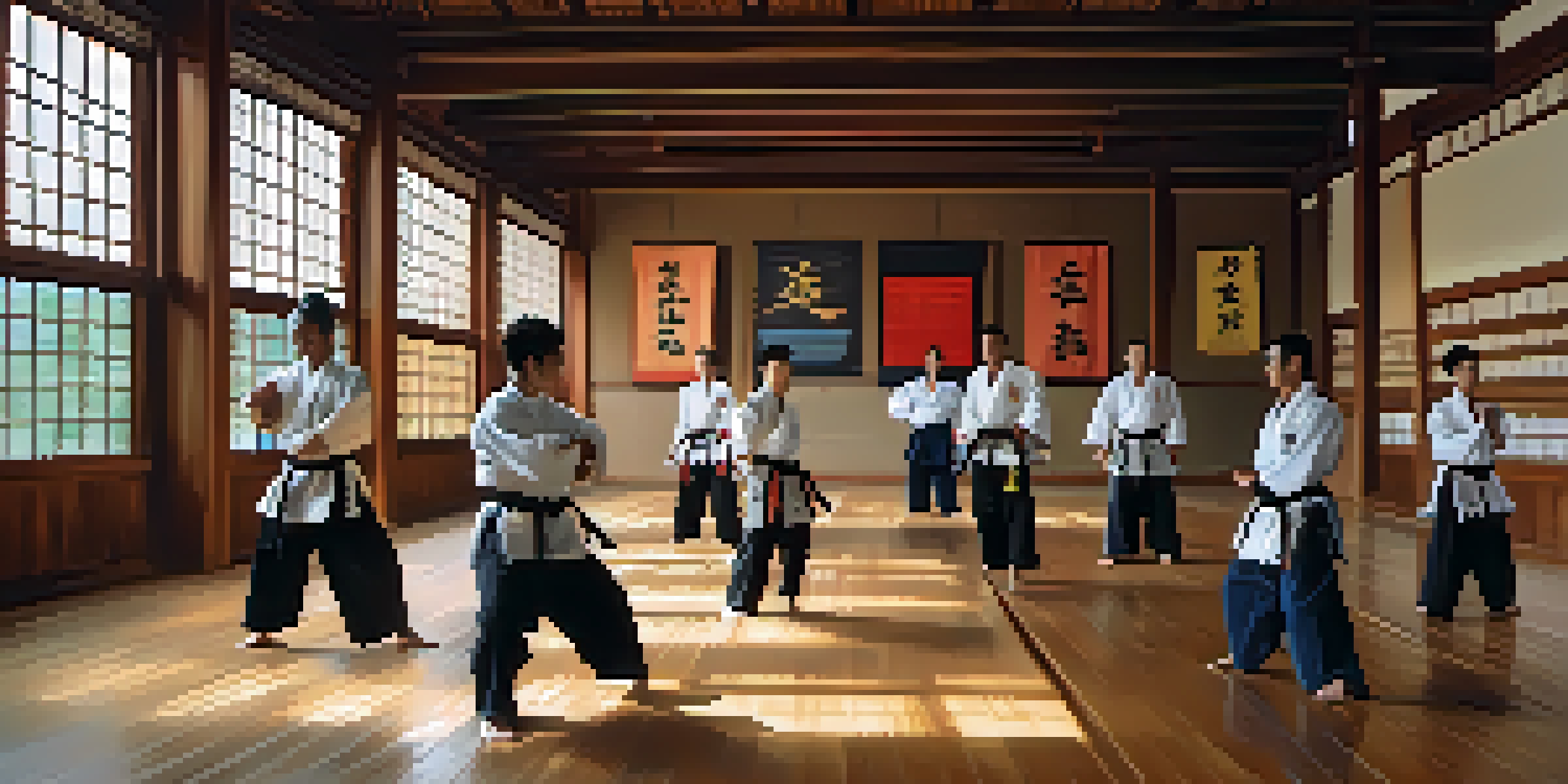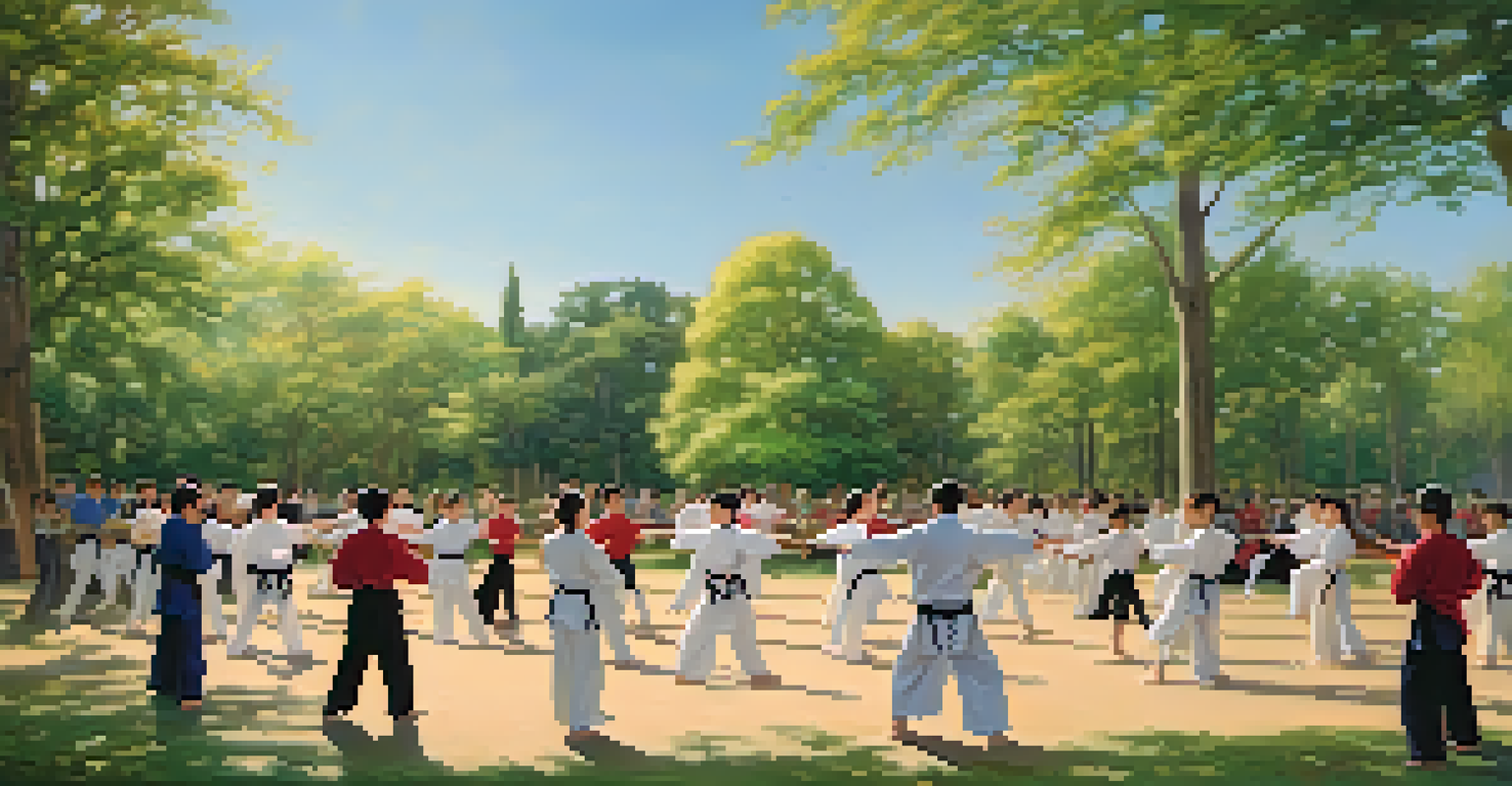Boosting Self-Esteem Through Martial Arts Training

Understanding Self-Esteem and Its Importance
Self-esteem is essentially how we perceive ourselves and our worth. It plays a crucial role in our daily lives, influencing our decisions, relationships, and overall happiness. A healthy self-esteem fosters resilience and empowers us to face challenges head-on.
Self-esteem is made up of the thoughts and beliefs we have about ourselves.
When self-esteem is low, it can lead to feelings of inadequacy and anxiety, making it difficult to engage fully in life. This is where martial arts can make a significant difference, offering a structured environment that promotes personal growth. By developing skills and discipline, practitioners can gradually shift their self-perception.
In martial arts, every small achievement, whether it’s mastering a technique or earning a new belt, contributes to a sense of accomplishment. This process not only enhances physical abilities but also nurtures a positive self-image, setting the foundation for improved self-esteem.
Martial Arts: A Journey of Personal Growth
Engaging in martial arts is more than just learning to defend yourself; it's a transformative journey. Through consistent practice, students learn perseverance, which is vital for building self-esteem. Overcoming challenges in training translates to overcoming personal barriers outside the dojo.

Each martial arts class presents new hurdles, whether it’s sparring with a partner or perfecting a complex move. As individuals push through discomfort and fear, they gain confidence in their abilities. This newfound strength can be incredibly empowering, leading to a more positive self-image.
Self-Esteem Boosted by Martial Arts
Martial arts training enhances self-esteem by providing a structured environment for personal growth and achievement.
Moreover, martial arts encourages a growth mindset, where mistakes are viewed as learning opportunities rather than failures. This shift in perspective is essential for nurturing self-esteem, as it allows individuals to celebrate progress rather than focusing solely on perfection.
Building Discipline and Focus Through Training
Discipline is a core principle of martial arts, and it's integral in boosting self-esteem. Regular training requires commitment, which cultivates a strong work ethic. As individuals commit to their practice, they develop a sense of responsibility towards their own growth.
Strength does not come from physical capacity. It comes from an indomitable will.
This disciplined approach extends beyond the dojo, influencing various aspects of life, such as academics, work, and personal relationships. When individuals see the results of their dedication, it reinforces their belief in their abilities. The connection between effort and achievement becomes clear.
Additionally, martial arts training requires focus, which sharpens the mind and enhances concentration. By honing these skills, individuals learn to direct their attention towards their goals, fostering a sense of control and confidence that positively impacts their self-esteem.
Cultivating Resilience Through Challenges
Martial arts training is filled with challenges that test both physical and mental limits. Facing these challenges head-on teaches individuals to be resilient, a key component of healthy self-esteem. Resilience nurtures the ability to bounce back from setbacks and continue striving towards goals.
Every time a practitioner falls or makes a mistake, they are encouraged to get back up and try again. This process of learning to overcome obstacles translates into real-life situations, where resilience is equally important. The ability to face adversity with a positive attitude is a game changer for self-worth.
Resilience Through Challenges
Facing challenges in martial arts cultivates resilience, empowering individuals to overcome setbacks and build confidence.
As practitioners navigate through sparring sessions or competitions, they learn to manage fear and anxiety. This experience builds emotional strength, helping individuals to understand that challenges are a part of growth, ultimately boosting their confidence in facing life's difficulties.
Fostering a Supportive Community
One of the most enriching aspects of martial arts is the sense of community it fosters. Training alongside peers creates a supportive environment where everyone encourages each other's growth. This camaraderie helps individuals feel valued and respected, bolstering their self-esteem.
Instructors play a crucial role in this community, providing guidance and mentorship. A positive relationship with a mentor can significantly impact one's self-perception. When students receive constructive feedback and praise, it reinforces their belief in their abilities.
Additionally, sharing experiences and challenges with others helps individuals realize they are not alone in their struggles. This connection can be incredibly uplifting, reminding everyone that everyone is on their personal journey, further enhancing self-esteem through mutual support.
Setting and Achieving Personal Goals
Martial arts training is structured around setting and achieving goals, which is crucial for self-esteem. Whether it’s earning a new belt or mastering a difficult technique, these milestones provide a sense of direction. Each goal accomplished serves as a building block for confidence.
Goal-setting in martial arts teaches individuals the importance of planning and perseverance. As practitioners break down larger objectives into smaller, manageable tasks, they experience the satisfaction of progress. This sense of achievement fuels motivation and self-belief.
Community Support Enhances Growth
The supportive community in martial arts fosters camaraderie and encourages individuals, reinforcing their self-worth.
Moreover, the journey towards these goals often involves teamwork and collaboration. Practicing with others encourages accountability and camaraderie, making the process enjoyable and reinforcing the idea that growth is a shared experience.
Embracing Confidence Beyond the Dojo
The benefits of martial arts training extend far beyond the dojo. As practitioners gain confidence in their abilities, they often find that this newfound self-esteem permeates other areas of their lives. This can lead to enhanced social interactions, improved performance at work or school, and greater overall well-being.
For many, the skills learned in martial arts translate into everyday situations, from public speaking to handling conflicts. The ability to assert oneself calmly and confidently is a powerful tool that can reshape one’s experiences. Practitioners often report feeling more empowered in their personal and professional lives.

Ultimately, the journey of martial arts is about transformation. It's about taking the lessons learned on the mat and applying them to life, fostering a lasting change in how individuals view themselves and their potential.